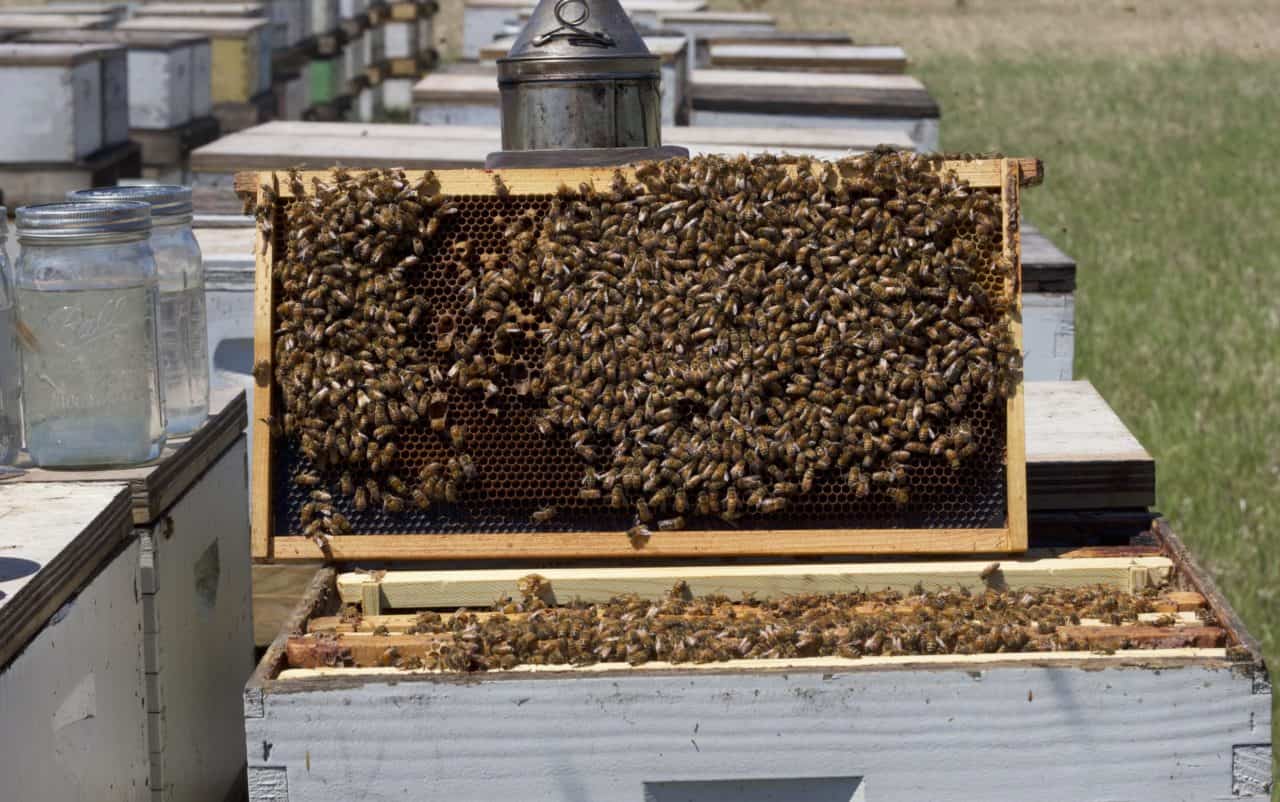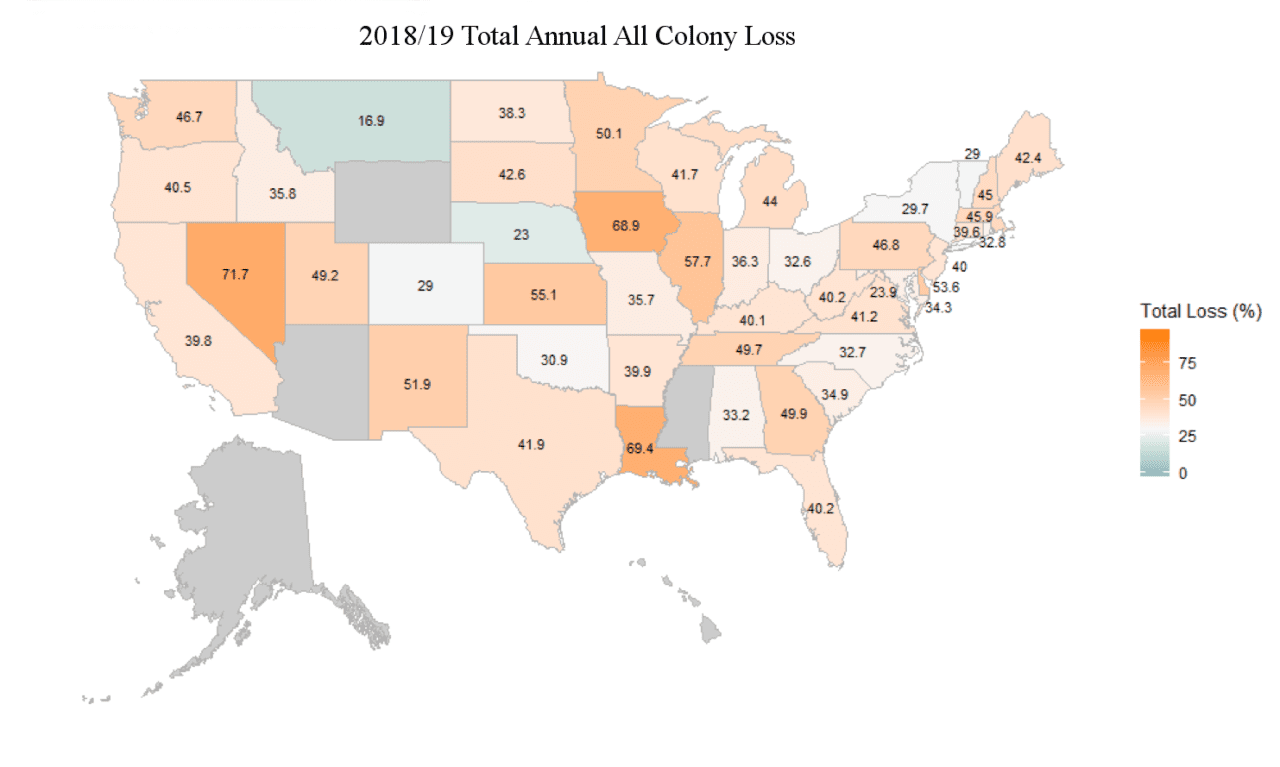* This is a profile of a 2019 paper: Use of Chemical and Nonchemical Methods for the Control of Varroa destructor (Acari: Varroidae) and the Associated Winter Colony Losses in U.S. Beekeeping Operations The Bee Informed Partnership (BIP) Loss and Management Survey is open for your responses for the whole month of April. We would like as many beekeepers as possible to fill it in during the remainder of the month. Every year that you fill out the survey you are making a valuable contribution to science, and to our understanding of what is going on in beekeeping around the country. With that in mind,…
Category: Winter Loss Survey
(Spo)oktober Blog: Don’t be afraid of State Specific Colony Losses!
Happy Fall y’all! In normal life, “Fall” means Halloween (and dressing up as fatbody-sucking Varroa mite) and Thanksgiving (we certainly are grateful to be part of the beekeeper community). In beekeeping life, “Fall” means that nectar flows come to an end, queens lay fewer eggs, winter bees are being reared and we have to (still) deal with Varroa mites. All this is happening for a reason: To get the bees ready for and successfully bring them through winter. (Hard to believe here in Alabama where it is still blazing hot!) You may remember that we reported the highest honey bee colony winter losses since the…
NOW LIVE! The 2018-2019 Colony Loss and Management Survey!
Good morning America! It’s beautiful outside! The birds are chirping and the bees are flying! You may even notice a few flowers outside too! Here in the South, our many azaleas are in full bloom! This means Spring is upon us! And of course, Spring means one thing: it’s time to take the Bee Informed Partnership’s annual Colony Loss and Management Survey! It’s easy! One click and you are in, ready to take the survey and to serve our nation’s beekeeping industry: TAKE THE SURVEY TODAY! The information that you provide will be invaluable to our understanding of honey bee health around the country. As…
BIP National Loss Survey Comparison with NASS results
The National Agricultural Statistical Service (NASS) recently reported the results of its second honey bee colony loss survey. The Bee Informed Partnership (BIP) also recently published preliminary loss results covering the same period. Despite the differences in methodology and sample sizes, these two surveys yielded comparable results. Specifically, we estimate 33.23% losses based on the BIP survey, and we estimate 35.39% losses when we use BIP methods to calculate losses from the NASS survey (Table 1). This is reassuring as it suggests past BIP surveys are representative of national losses despite the non-random nature of the BIP respondent pool. Both of these surveys were created…
National Management Survey App
If you haven't heard by now, the Bee Informed Partnership has been hosting an annual management survey for many years. The survey is data intensive and collects detailed information about many different aspects of beekeeping. The survey has reached tens of thousands of beekeepers and has spanned the better half of the last decade. The survey has proved to be very successful and has generated a significant amount of data. Our team of researchers and technology professionals have spent many years analyzing this data to gain a clearer picture of honey bee health. Now, we want to make this data easily accessible to everyone by…
Interpreting and Understanding the Differences in Honey Bee Colony Loss Numbers From Different National Surveys.
Over the last year, and for the first time, the National Agricultural Statistical Service (NASS) conducted a survey to monitor colony losses. The Bee Informed Partnership (BIP), in collaboration with the Apiary Inspectors of America, has also recently published preliminary loss data covering the same time period. While the core purpose of these two surveys are the same, to track honey bee colony losses in the US, there are significant and important differences in survey design (questions asked), delivery, data presentation, and the methodology by which loss rates are calculated. These differences mean that dissimilarities in loss rates reported by both surveys are expected. This…
National Colony Loss and Management Survey: You’ve Got Questions We’ve Got Answers
Thank you to the 2,500+ beekeepers who already took the survey! As of this morning (4/6/2016), over 2,500 of you already submitted your answers to the Colony Loss Survey and over 1,500 of you continued to the Management Survey. Thank you for your time and continued support! This current rate of participation tracks very well with past years and we are expecting to reach over 7,000 responses by the end of the month. Thank you also for spreading the word about our survey. The traffic on our survey website was very intense on April 1st and we apologize if any of you encountered difficulty or…
2015-2016 Colony Loss and Management Survey Is Live: Take the Survey Today!
It is April 1st and that can only mean one thing at the Bee Informed Partnership – our National Loss and Management survey is LIVE! Starting now and continuing until April 30th, your responses from this survey provide invaluable information that helps us obtain a clear picture of honey bee health throughout the country and helps guide best management practices. Thank you for all the beekeepers who, for 10 years now, have taken the time to complete the Colony Loss survey. Additional appreciation goes to those beekeepers who have provided data for our Management survey for the past 5 years. Correlating management practices with colony…
National Colony Loss and Management 2015-2016 Survey
This is no April's fool! The 2015 - 2016 National Colony Loss and National Management Survey will be ready to accept submissions starting April 1st and continuing until April 30th. The results that are received from this survey provide invaluable information that helps us obtain a clear picture of honey bee health throughout the country. Without the aid of the many beekeepers who participate in this survey we would never be able to obtain the results that we have received in the past and hope to continue to receive in the future. If you would like to take an early peek at the 2015 –…
The Colony Loss Map is Up and Running
The marriage between data collection and GIS just got a little sweeter for the bees and their keepers around the country. Years of Winter Loss data are now accessible through a masterfully created, interactive web map. It has been a long time coming. We are so excited to continue to provide beekeepers with the information they need to keep healthier bees. Click the map to check it out! This is only the beginning so stay tuned as we create and build upon data accessibility for everyone. Next year’s data will be added once the survey is complete. Sign up to take the surveys and you can add…


